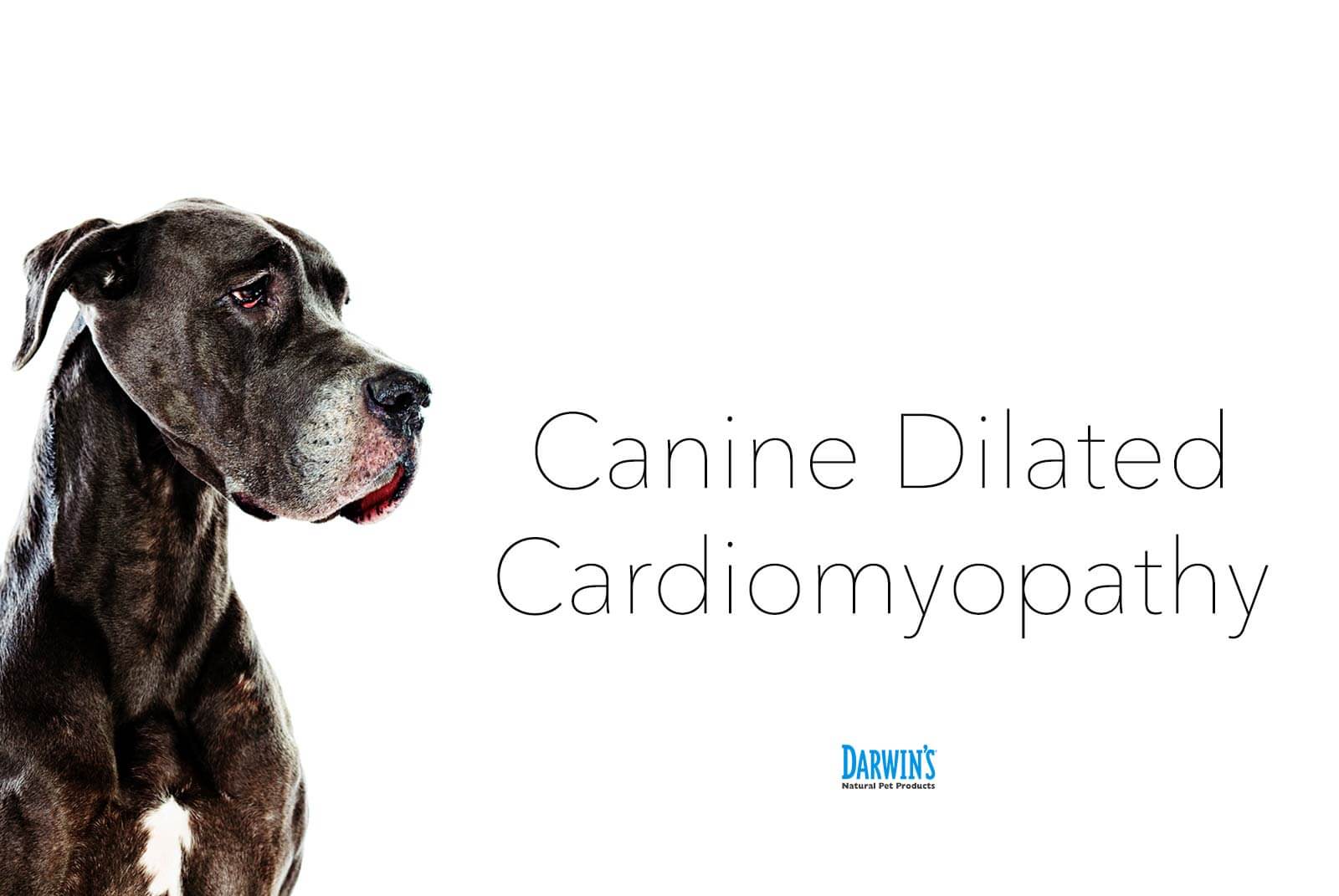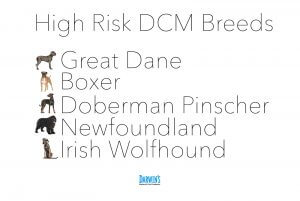Everything You Need to Know About DCM in Dogs
8/2/18

What is DCM in dog and how does it affect a dog health?
We received a canine heart disease question on our Facebook page and wanted to share the answer with everyone. A new FDA report states that there is potentially a connection between a grain-free diet and Dilated Cardiomyopathy (DCM) in dogs. Grain-free encompasses a wide array of foods and options for your pet. With this in mind, we think everyone should be fully educated about what the FDA findings suggest, how it relates to DCM, and what it means for your pet. Here is everything you need to know about canine “Dilated Cardiomyopathy” (DCM).
What Is DCM in Dogs?
Canine Dilated Cardiomyopathy (DCM) is a disease of a dog’s heart muscle, which results in an enlarged heart. As the heart and its chambers become dilated, it becomes harder for the heart to pump, which may cause heart valves to leak, leading to a buildup of fluids in the chest and abdomen. Dogs with DCM can often suffer congestive heart failure.
The underlying cause of DCM is not truly known, but because certain larger breed dogs are more prone to the disease some causes may be a result of genetics.
Breeds Affected by DCM
Here are some of the dog breeds that are affected by DCM:
- Great Dane
- Doberman Pinscher
- Boxer
- Newfoundland
- Irish Wolfhound
- English and American Cocker Spaniel (though not a large breed)
- Golden Retriever
- Scottish Deerhound

Another reason some dogs may develop DCM is due to a deficiency in the amino acid, taurine. However, taurine is not considered an essential amino acid for dogs, as their bodies can usually produce it on their own. Conversely, taurine is an essential amino acid for cats.
Potential Connection Between “Grain-Free” Diets and Canine Heart Disease
DCM has received a lot of coverage recently in the media as more cases are appearing in dogs that aren’t typically prone to the disease. Ultimately, this attention prompted the FDA to issue a warning about the disease in relation to some dog food ingredients and we welcome the opportunity to share how natural raw meals relate to this news. The diets of the cases reported to the FDA appear to all be from kibble products, which frequently contain potatoes or multiple legumes such as peas, lentils, and other “pulses” (seeds of legumes). In these particular diets, these “fillers” are typically listed as primary ingredients, and in these cases grain-free also means low in protein.
Dogs can create their own taurine (a deficiency of this amino acid may lead to DCM), most high-protein meals (such as Darwin’s) do not include taurine supplements. Rather, our formulas provide naturally occurring taurine which is found through the primary ingredients we use in our meals — muscle meats and organs.
However, as grain-free dry dog food is a newer food trend, it is possible that the high carbohydrate content in these diets are depleting taurine levels and/or making the taurine less “bio-available.” When there is a higher starch level in any pet food, there is less protein. While dogs can usually produce enough taurine on their own, it has been found that, in some cases, larger dogs may not produce enough taurine. So, feeding them a diet that supplies some taurine can be useful. The FDA study indicates that, perhaps, dogs on high carbohydrate diets may not be producing enough taurine.
Expert Opinion on Grain-Free Diets and DCM
Dr. Karen Becker, a world-renown, leading holistic veterinarian, recently wrote “grain-free/low-protein commercial diets are very high in carbohydrates, which displace amino acids. They also contain anti-nutrients (e.g., saponins, trypsin inhibitors, phytates, and lectins) that may interfere with taurine absorption. When you add in the high-heat processing used to manufacture kibble, it’s hardly surprising that these diets aren’t an adequate source of taurine for many dogs.”
The Naturally Occurring Taurine in Raw Meat Poses Minimal Risks
Most raw dog foods on the market, including Darwin’s, have low amounts of starchy vegetables for dogs, and we do not include pea or tapioca starches, which are high in carbohydrates. Well-balanced formulas with beef, chicken and lamb meat, like Darwin’s, are high in protein, moderate in balanced fats, and low in total carbohydrates. It reduces the implications of the carbs interfering with taurine absorption for healthy dogs.
Until we have more information on this subject, we recommend pet owners feed their dogs (especially if they have a high-risk breed and are concerned about low taurine absorption) raw dog food (cooking can deplete the taurine) and consider including a can of sardines to your dog’s diet on a weekly basis as marine proteins are high in taurine.
Symptoms and Signs of DCM in Dogs
The tricky part about DCM is that there aren’t usually a ton of early warning signs. However, as the disease progresses in a dog, they’ll start to exhibit some symptoms of issues with the heart function such as:
- Fainting spells
- Coughing
- Difficulty breathing
- Lethargy
- Lack of interest in physical activity
- Distension of the abdomen with fluid
You should pay close attention to your dog’s body language for signs of health issues. These signs are also related to congestive heart failure, which is usually the outcome for dogs with DCM. It is important to bring your affected dog to a veterinary medicine clinic specializing in internal medicine right away after noticing these.
Prognosis for Dogs With DCM
Unfortunately, DCM is not a disease that’s easy to detect in a dog until symptoms begin to present themselves. At that point, your pet may already be close to or experiencing congestive heart failure. Many dogs showing signs of congestive heart failure often die within six months to two years of diagnosis3, underscoring the importance of critical care in managing the disease. However, there are cardiac medications to help treat the disease by improving heart functions and eliminating pulmonary congesting. As the case with any illness, early diagnosis is key to treatment and putting your pet onto cardiac medication during the early stages of the disease can make a difference. Work with your vet to determine the right course of treatment.
In the meantime, our pet food consultants have years of experience with raw natural pet food and are ready to answer your questions about your dog’s diet. Feel free to call us at (877) 738-6325 Monday through Friday 6 a.m. to 6 p.m. pacific time or send your questions via email to [email protected].
James Pendergast, Product Manager
Darwin’s Natural Pet Products



